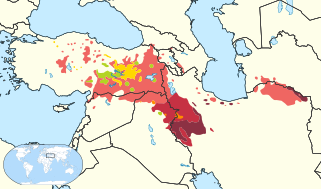Kurdish is the language of Kurdistan and is used by about 35 Million people in different countries:
Kurdistan is separated between: Turkey, Iran, Iraq and Syria
Kurdish is an Indo-European language and belongs to the Iranian lnaguages, it is closely related to other languages such as Persian / Farsi, Dari, Beluchi and Pashtu.

Kurdish can be sub-divided into several dialects:
-Kurmandji
- Sorani
- Zazaki
- Gorani
- Southern Kurdish

During the centuries of its history it has had a lot of contact with other languages such as Aramaic, Arabic, Armenian and Turkish; in its recent past there has also been a certain influence from European languages.
A special phenomen of the Kurdish language can be found with the verbs: Kurmandji uses the Ergative - in contrary to most Indo-European languages.
Logical subjects appears when the verb is ergative as objects. The grammatical subject does not equal the logical subject.
A few examples in other languages:
- German: es geschieht mir - it happens to me
- French: ça me plaÎt - it pleases to me
In Kurmandji, the agens, the acting person, is not in Casus Rectus (Nominative), but in Casus Obliquus (Accusative, Dative, Genitive).
The Ergative is used with transitive verbs.
Example: I saw you.
| Obliquus | Rectus |
Verb |
Min |
tu |
dĂŽtĂŽ. |
Me |
you |
saw. |
There is no Ergative with intransitive verbs.
Example: I came.
| Rectus | Verb |
Ez |
hatim. |
I |
came. |
The formation of the tenses in Kurdish / Kurmandji follow the scheme below:
| Personal Pronoun | Indicative Present |
Indicative Present Continuous Form |
Conjunctive Present |
Imperative |
Future |
ew |
diçe |
diçeye |
biçe |
biçe! |
ewê biçe / |
he |
goes |
is going |
go |
go! |
will go |
Bildungsschema:
| Personal Pronoun | Indicative Present |
Indicative Present Continuous Form |
Conjunctive Present |
Imperative |
Future |
ew |
di- ... |
di- ... -e / -ye |
bi- ... |
bi- ...! |
-ĂŞ bi- ... / |
çÝn / çÝyin - to go
The prefix di- expresses the present.
| Kurdish | English |
||
Personal Pronoun |
Verb |
Personal Pronoun |
Verb |
ez |
diçim |
I |
go |
tu |
diçÎ |
you |
go |
ew |
diçe |
he / she / it |
goes |
em |
diçin |
we |
go |
hĂťn |
diçin |
you |
go |
ew |
diçin |
they |
go |
çÝn / çÝyin - to go
The prefix di- and the ending -e / -ye express the present continuous.
| Kurdish | English |
||
Personal Pronoun |
Verb |
Personal Pronoun |
Verb |
ez |
diçime |
I |
am going |
tu |
diçÎye |
you |
are going |
ew |
diçeye |
he / she / it |
is going |
em |
diçine |
we |
are going |
hĂťn |
diçine |
you |
are going |
ew |
diçine |
they |
are going |
çÝn / çÝyin - to go
The prefix di- expresses the conjunctive present.
| Kurdish | English |
||
Personal Pronoun |
Verb |
Personal Pronoun |
Verb |
ez |
biçim |
I |
go |
tu |
biçÎ |
you |
go |
ew |
biçe |
he / she / it |
goes |
em |
biçin |
we |
go |
hĂťn |
biçin |
you |
go |
ew |
biçin |
they |
go |
çÝn / çÝyin - to go
1st possibility - colloquial
-ĂŞ / - yĂŞ are added to the personal pronoun.
| Kurdish | English |
||
Personal Pronoun |
Verb |
Personal Pronoun |
Verb |
ezĂŞ |
biçim |
I |
will go |
tuyĂŞ |
biçÎ |
you |
will go |
ewĂŞ |
biçe |
he / she / it |
will go |
emĂŞ |
biçin |
we |
will go |
hĂťnĂŞ |
biçin |
you |
will go |
ewĂŞ |
biçin |
they |
will go |
2nd possibility - written
The particle dĂŞ expresses the future. DĂŞ appears as a single word.
| Kurdish | English |
||
Personal Pronoun |
Verb |
Personal Pronoun |
Verb |
ez |
dê biçim |
I |
will go |
tu |
dê biçÎ |
you |
will go |
ew |
dê biçe |
he / she / it |
will go |
em |
dê biçin |
we |
will go |
hĂťn |
dê biçin |
you |
will go |
ew |
dê biçin |
they |
will go |
çÝn / çÝyin - to go
The prefix bi- is used for the formation of the imperative.
| Kurdish | English |
Biçe! |
Go! |
Ew biçe! |
He / she / it shoud go! |
Em biçin! |
Letâs go! |
(hÝn) biçin! |
Go! |
Ew biçin! |
They should go! |
| Kurdish | English |
bira, bradar |
brother |
birin |
bring |
birĂť |
brow |
nav |
name |
nĂť, nev |
new |
stĂŞrk, stĂŞr |
star |
Also read (in German):Â
more information: info@longua.org
LONGUA.ORG: languages.li, longua.org in Italien, longua.org in Deutschland, longua.org in China, B1-Test (Schweiz), B2-Test (Schweiz), Allemand à Munich.ch, Soggiorni in Germania.it, Apprendre Allemand, 木木杨的博客 - China